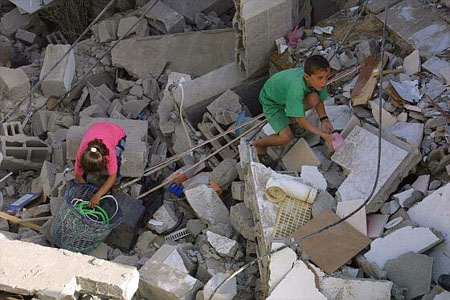
Photo: Mohammed from Rafah, www.rafah.vze.com
|
|
|
Umm Abdel Jabbar 'Adwan, Gaza City, March 31, 1998:
|
|
Gaza was the first leg of my research plan to record Palestinian women's stories of displacement. It was also the first time I had ever recorded outside Lebanon. All the research I had ever done until now had been in the refugee camps in Lebanon. These were as familiar to me as the homes of relatives or neighbours.
In other parts of the Palestinian diaspora I felt shorn of these familiar anchors. There wasn't time to get to know communities the way I had got to know Shatila. I must venture in without references. I felt naked. I wasn't even sure if I'd be able to communicate, given my Lebanese/Palestinian Arabic accent. Would people trust me enough in a one-time visit to record personal stories? How could I build 'rapport' in the short time available? With such fears, I gratefully welcomed Andalib 'Adwan's suggestion that I begin with her mother, Umm Abdel Jabbar. This would be a trial-run. If Umm Abdel Jabbar understood me and responded, I could take it as a green light. There were other reasons besides being the first in a strange place why this was a memorable recording. Umm Abdel Jabbar had recently moved to Gaza City from Rafah camp, where she had spent most of her life. The new flat seemed very large and empty, with no visible furniture except floor mats and a few plastic chairs. Andalib purposely didn't accompany me - I found Umm Abdel Jabbar alone except for a cluster of granddaughters, and two adult sons. She was shy - as I was - but not reticent. As soon as I opened the tape recorder she began to tell the story of her life. She had been married at the age of twelve to the muhktar of her village (Barbara, southern Palestine.) She repeated "twelve years" for emphasis - and then recited the name and age of each of her children. Later, in response to questions, she gave a rich account of the flight from Palestine, the early refugee days and how the village stayed together; then later wars and uprisings. I felt reassured. Umm Abdel Jabbar's dialect was different from that of |
'Lebanese' Palestinians but I could understand most of what she said. She was franker than I would have expected about her life as junior second wife. She didn't shy away from more 'sensitive' questions, such as "What did you do in the Intifada?"
After I had switched off the recorder, a few precious extra exchanges took place. Umm Abdel Jabbar wasn't really comfortable in the new high-rise apartment in Gaza City - she was missing Rafah camp. I guessed that some family necessity had imposed this displacement on her - maybe a daughter's divorce? If at her age, she was obliged to make a move she didn't want, if she was still prisoner of family pressures as to where she should live, I felt this cast doubt on the theory that Arab/Muslim's women's status improves with age. At least it alerted me to the distinction between 'status' and 'freedom'. Struck by the unusually grand names of her children - Abdel Jabbar, Andalib, Asmahan, Abdel Moneim - I ask her who had named the children? She replied "Their father". "What about the girls? Didn't he leave their names to you?" She smiled a sweet smile - should I read it as resigned? complicitous? proud? "Even the girls he named". Umm Abdel Jabbar begins her story: |
[Amneh Zakkout] Copyright©2005 |
|